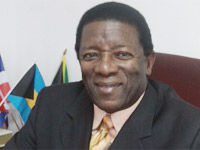
The legal circus known as the Weissfisch case has no end in sight as the latest hearing before the Court of Appeal was rescheduled last week and is now set for November 12.
The case is fraught with alleged corruption in the dysfunctional courts of The Bahamas.
The six-year legal wrangle between the two millionaire Israeli brothers began in England in 2006 when Rami Weisfisch was accused by his younger brother, Amir Weissfisch, of refusing to account for his partnership profits.
Note that the brothers spell their surnames differently. Rami Weisfisch dropped an ‘s’ from the family Weissfisch surname in the spelling of his own name.
Their firm, the Metals Resources Group, became a dominant force in the global cobalt market in London in 1999. The company closed in 2002.
The origins of the dispute follow an incident in 2001 when Rami was about to have life-threatening heart surgery and wanted to make sure that his family would be provided for if he died. Amir claims that he transferred $88m in assets to Rami and his daughter to ensure the financial security of Rami’s family.
The alleged agreement also stated that if Rami lived, “the sum of $37.5m would be repaid to (Amir) within three months, along with further sums to be identified.”
But Rami survived his heart bypass operation and allegedly failed to live up to the terms of the oral agreement by refusing to repay the money to Amir. Rami also continued to assert rights over the MRG Group and to direct the business of the company.
Since 2006, claims and counter-claims have been exchanged between the parties.
Since the firm was registered in the Bahamas, litigation continued there. And that’s when it started getting even weirder.
The Bahamas is known worldwide as a jurisdiction with a corrupt and dysfunctional legal system. Nowhere has that been made more apparent than in the Weissfisch case.
Three different judges have recused themselves at the request of Rami’s legal team. Justice Lyons was the first to hear the case. He quit the bench after being embroiled in a scandal allegedly set up by members of a group known as the “legal mafia.”
The clandestine group allegedly hired a woman to seduce the judge and steer a financial audit of the case to her accountant brother. Judge Lyons foolishly appointed the woman’s brother to review the finances of the Weissfisch case in exchange for a multi-million dollar fee, an absurd amount for such an audit.
The legal mafia then leaked news of the judge’s relationship with the woman to the press and Judge Lyons was forced to resign the bench in disgrace.
After Judge Lyons quit, the case went to Justice Anita Allen, then to Justice Jon Isaacs, who both recused themselves.
The last judge, Justice Stephen Isaacs initially refused Rami’s request that he recuse himself.
Rami had alleged that Justice Isaacs had shown bias towards his younger brother, which the judge denied.
However, Justice Isaacs later, of his own volition, removed himself from the case.
One of the bones of contention with Justice Stephen Isaacs had to do with stenographer notes and transcripts of the case, as there is some concern that these have been altered.
There was a request for the Supreme Court stenographer’s original notes from the hearings before Justice Isaacs in the lower court, since full trial transcripts have, mysteriously, not been available for some time.
However, Appeal Court Justice Christopher Blackman stated that he “was not inclined to order the production of any notes” as he did not wish to “question the integrity of the stenographers”.
Another point that was raised concerned a recent confidentiality order made by a judge regarding aspects of the case. The order is still pending. Curiously, the Appeal Court Justices refused to set a date for leave to appeal the order.
Allen Steinfeld, QC, who represents Amir, asked the bench of justices Christopher Blackman, Abdulai Conteh and Stanley John to consider requiring Rami to post a security for costs since he did not live in The Bahamas and has no assets that they know of in his name.
The court said it would take the matter under advisement. Nicholas Lavender, QC, appears for Rami.
Counsel for Rami Weisfisch must file their submissions by September and the responding party, Amir Weissfisch and his counsel were ordered to file their responses by October.
The hearing before Justices Blackman, Stanley John and Abdulai Conteh will be held on November 12.



